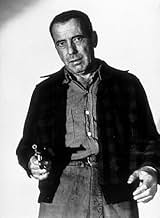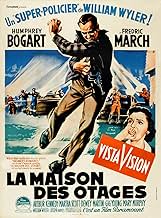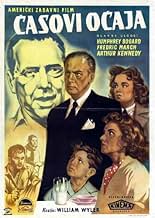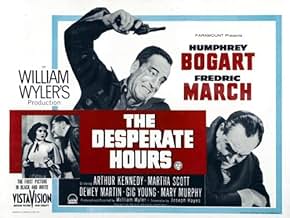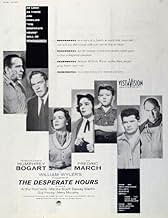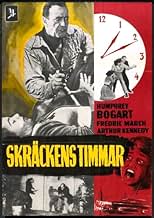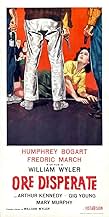AVALIAÇÃO DA IMDb
7,4/10
11 mil
SUA AVALIAÇÃO
Adicionar um enredo no seu idiomaThree escaped convicts move in on and terrorize a suburban household.Three escaped convicts move in on and terrorize a suburban household.Three escaped convicts move in on and terrorize a suburban household.
- Direção
- Roteiristas
- Artistas
- Prêmios
- 2 vitórias e 1 indicação no total
Walter Baldwin
- George Patterson
- (não creditado)
John Benson
- Bellboy
- (não creditado)
Paul E. Burns
- Chef at Al's Dining Room
- (não creditado)
Edmund Cobb
- Mr. Walling
- (não creditado)
Avaliações em destaque
Few actors can play a gangster like Humphrey Bogart and few actors can play a decent family man like Fredric March. Both combine to give excellent performances in this thriller that explores three desperate men invading an upper middle class home after escaping from prison. William Wyler sees to it that his audience feels confined as most all the scenes are within the home. It builds to a dramatic conclusion that might not be what you expect but non-the-less believable. You feel empathy for Bogarts character and for that of his brother but ,even so, you will be rooting for the family to survive. An excellent cast adds a lot to this film. There are a few overly dramatic moments, however, they are brief.Desperate Hours will entertain you and keep you guessing. Try and see it!
These are the times when danger looks us in the face, when terror, torment, tyranny lends an embrace, as all we cherish and endear, goes toe to toe with every fear, and the world that was secure, falls out of place. When every movement of the clock is an attack, facades of life engraved with fractures, widened cracks - tremors, trembles, quaking dread, in not too long, you might be dead, as the desperation reaches, a climax.
It's of its time but it does still stand up to be counted all these years later, with superb performances throughout, especially HB, who as an actor matured with magnificence in the latter years of his movie making career.
It's of its time but it does still stand up to be counted all these years later, with superb performances throughout, especially HB, who as an actor matured with magnificence in the latter years of his movie making career.
THE DESPERATE HOURS
Aspect ratio: 1.85:1 (VistaVision)
Sound format: Mono
(Black and white)
The patriarch of a middle-class suburban family (Fredric March) is forced to take action when they're held hostage in their own home by three escaped convicts, one of whom (Humphrey Bogart) is an experienced lifer with nothing to lose...
The first and only pairing of superstars Bogart and March is a tightly-wound thriller, written by Joseph Hayes (based on his novel and stageplay, inspired by actual events), and directed by Hollywood veteran William Wyler, distancing himself from the 'women's pictures' he had helped to popularize during the 1940's (THE LITTLE FOXES, MRS. MINIVER, THE HEIRESS etc.). Photographed in gleaming deep-focus VistaVision by Lee Garmes (SCARFACE, THE PARADINE CASE), the movie wrings incredible tension from the claustrophobic settings and frequent stand-offs between staunch family man March and embittered con Bogart. The movie's themes are fairly conservative and the outcome is never really in doubt, but this is a top-drawer thriller from Hollywood's 'golden age'. Also starring Arthur Kennedy, Martha Scott, Dewey Martin and Gig Young in crucial supporting roles. Unmissable.
NB. Though nowhere near as dreadful as most critics would have you believe, Michael Cimino's remake DESPERATE HOURS (1990) isn't a patch on the original.
Aspect ratio: 1.85:1 (VistaVision)
Sound format: Mono
(Black and white)
The patriarch of a middle-class suburban family (Fredric March) is forced to take action when they're held hostage in their own home by three escaped convicts, one of whom (Humphrey Bogart) is an experienced lifer with nothing to lose...
The first and only pairing of superstars Bogart and March is a tightly-wound thriller, written by Joseph Hayes (based on his novel and stageplay, inspired by actual events), and directed by Hollywood veteran William Wyler, distancing himself from the 'women's pictures' he had helped to popularize during the 1940's (THE LITTLE FOXES, MRS. MINIVER, THE HEIRESS etc.). Photographed in gleaming deep-focus VistaVision by Lee Garmes (SCARFACE, THE PARADINE CASE), the movie wrings incredible tension from the claustrophobic settings and frequent stand-offs between staunch family man March and embittered con Bogart. The movie's themes are fairly conservative and the outcome is never really in doubt, but this is a top-drawer thriller from Hollywood's 'golden age'. Also starring Arthur Kennedy, Martha Scott, Dewey Martin and Gig Young in crucial supporting roles. Unmissable.
NB. Though nowhere near as dreadful as most critics would have you believe, Michael Cimino's remake DESPERATE HOURS (1990) isn't a patch on the original.
Dan Hilliard and his family are perfect Americans, corresponding admirably to the bourgeois ideal. The two children are bright, good-looking and obedient. Cindy is about 20 and is going steady with an attorney who owns a sports car. Ralphy is eight or so, all plaid shirts, jeans and attitude. He has a baseball mitt and a bicycle. Ellie, Dan's wife, runs their spotless home with quiet efficiency. Everything is in its place. Trash collectors call at fixed times. Breakfast is a serene family ritual. The Hilliards' home life is as balanced, as regular and as dull as the barometer on the wall. As for Dan Hillier himself, he has attained that mythic status to which all 1950's bourgeois males aspired - he is an executive. The middle classes don't want adventure in their lives, they want predictability. And this is the perfect, dream-like state in which the Hilliards pass their anodyne existence, secure in their suburban womb - until the American Nightmare is unleashed upon them.
What if members of The Underclass, with their dirty, unshaven physicality and their sagging, torn clothes should irrupt into the suburbs? What if, by some catastrophic failure, the police and the prison service can't keep The Underclass in its designated containers? How will nice folks like the Hilliards cope if confronted by these alien beings?
There has been a jailbreak. The citizens of Indianapolis have been warned to watch out for three desperadoes - the two Griffin brothers and their accomplice Kobish. Little do the Hilliards realise as they go about their tranquil suburban lives, but the fugitives are about to choose the Hilliard home as a place to hole up ...
Like "Suddenly", made a year earlier, this is a 'bad guys invaded my home' movie. The downside of bourgeois affluence is the fear that the disenfranchised masses will come to take away your goodies.
Humphrey Bogart was in his late 50's and clearly ailing when he played the part of Glenn Griffin, the leader of the fugitive trio. He would make only two more films in the short time that was left to him. Dewey Martin, 26 years his junior, plays his kid brother Hal.
More than anything, "The Desperate Hours" is a film about social class. "You can't play ball with savages like that," opines a Madison County detective. Glenn holds his social superiors in equal contempt, calling them "smart-eyed respectable suckers". He warns Hal not to expect any favours from the class enemy: "Guys like Hilliard ever give you a fair shake?" Much play is made of linguistic markers which separate the educated from the rest ('whom' instead of 'who'), and contrasts in table manners between the refined Hilliards and their thuggish captors. Glenn lashes out against the tea tray, that emblem of middle-class gentility, and the virginal Cindy, whom he urges Hal to 'take'.
Dire though the Hilliards' predicament may be, they are not alone. They are exactly the kind of people the forces of law and order exist to protect and serve, and it is not long before Madison County's finest and the FBI are closing in on the fugitives. And the cops have science on their side. They can tap the phone of Glenn's girlfriend in Pittsburgh, and tail her across America as she heads for the rendezvous. In the police station, the humming wires never rest as technology narrows down the bad guys' options.
Middle-class sensibility is all-pervasive. Chuck and Cindy argue near the sports car, but break off abruptly when two people pass by. No matter how deeply the emotions may run, it isn't seemly to fight in front of the neighbours. Dan's secretary can tell, from nuances of his behaviour, that something is very wrong. Similarly, the trashman senses that things are amiss with Ellie by the quality of her chat. We see Cindy admiring her curves in front of the hallway mirror, because it is important that she be sexually desirable (so that the fugitives will regard her as a chattle). Chuck, however, has to remain sexually thwarted, because his behaviour is bound by rigid bourgeois restrictions. We see him raise the arm-rest in his sports car in the hope of a grappling session with Cindy, then lowering it dejectedly when he realises that his luck is out. Dan's wave to Chuck to cross the threshold is a symbolic acceptance of him as a son-in-law. He has made it into The Family.
Light represents goodness. Cindy comes home after another chaste date with Chuck and is bathed in bright light on the doorstep. Dan and Ellie declare their love for each other, their bodies lit intensely in an otherwise black bedroom. The searchlights of the police, and the bad guys' vain attempts to eradicate them, show us figuratively what we yearn to see - that good will always triumph over social disruption.
The overpowering of Ellie, the smashing of Ralphy's toy plane and the collapse of Cindy all happen on the same spot and are all filmed from the same low angle. These dramatic incidents show the Hilliards at bay, and the unusual vantage-point stresses the 'wrongness' of what is happening.
Implausibilities abound throughout the movie. How likely is it that the front door would be left unlocked, that Chuck would reach the house ahead of the cops, or that Dan would insist on carrying a gun, then empty its clip? Why would he hesitate to call the police in, once he got the upper hand? Why would everyone leave the family unattended, moments after the conclusion of a violent and dramatic siege?
And yet it works. Glenn's love of his brother breaks through his tough-guy facade, and after he gives his guns away he undergoes a tragic 'King Lear' moment of self-realisation. These are powerful moments in a powerful film.
What if members of The Underclass, with their dirty, unshaven physicality and their sagging, torn clothes should irrupt into the suburbs? What if, by some catastrophic failure, the police and the prison service can't keep The Underclass in its designated containers? How will nice folks like the Hilliards cope if confronted by these alien beings?
There has been a jailbreak. The citizens of Indianapolis have been warned to watch out for three desperadoes - the two Griffin brothers and their accomplice Kobish. Little do the Hilliards realise as they go about their tranquil suburban lives, but the fugitives are about to choose the Hilliard home as a place to hole up ...
Like "Suddenly", made a year earlier, this is a 'bad guys invaded my home' movie. The downside of bourgeois affluence is the fear that the disenfranchised masses will come to take away your goodies.
Humphrey Bogart was in his late 50's and clearly ailing when he played the part of Glenn Griffin, the leader of the fugitive trio. He would make only two more films in the short time that was left to him. Dewey Martin, 26 years his junior, plays his kid brother Hal.
More than anything, "The Desperate Hours" is a film about social class. "You can't play ball with savages like that," opines a Madison County detective. Glenn holds his social superiors in equal contempt, calling them "smart-eyed respectable suckers". He warns Hal not to expect any favours from the class enemy: "Guys like Hilliard ever give you a fair shake?" Much play is made of linguistic markers which separate the educated from the rest ('whom' instead of 'who'), and contrasts in table manners between the refined Hilliards and their thuggish captors. Glenn lashes out against the tea tray, that emblem of middle-class gentility, and the virginal Cindy, whom he urges Hal to 'take'.
Dire though the Hilliards' predicament may be, they are not alone. They are exactly the kind of people the forces of law and order exist to protect and serve, and it is not long before Madison County's finest and the FBI are closing in on the fugitives. And the cops have science on their side. They can tap the phone of Glenn's girlfriend in Pittsburgh, and tail her across America as she heads for the rendezvous. In the police station, the humming wires never rest as technology narrows down the bad guys' options.
Middle-class sensibility is all-pervasive. Chuck and Cindy argue near the sports car, but break off abruptly when two people pass by. No matter how deeply the emotions may run, it isn't seemly to fight in front of the neighbours. Dan's secretary can tell, from nuances of his behaviour, that something is very wrong. Similarly, the trashman senses that things are amiss with Ellie by the quality of her chat. We see Cindy admiring her curves in front of the hallway mirror, because it is important that she be sexually desirable (so that the fugitives will regard her as a chattle). Chuck, however, has to remain sexually thwarted, because his behaviour is bound by rigid bourgeois restrictions. We see him raise the arm-rest in his sports car in the hope of a grappling session with Cindy, then lowering it dejectedly when he realises that his luck is out. Dan's wave to Chuck to cross the threshold is a symbolic acceptance of him as a son-in-law. He has made it into The Family.
Light represents goodness. Cindy comes home after another chaste date with Chuck and is bathed in bright light on the doorstep. Dan and Ellie declare their love for each other, their bodies lit intensely in an otherwise black bedroom. The searchlights of the police, and the bad guys' vain attempts to eradicate them, show us figuratively what we yearn to see - that good will always triumph over social disruption.
The overpowering of Ellie, the smashing of Ralphy's toy plane and the collapse of Cindy all happen on the same spot and are all filmed from the same low angle. These dramatic incidents show the Hilliards at bay, and the unusual vantage-point stresses the 'wrongness' of what is happening.
Implausibilities abound throughout the movie. How likely is it that the front door would be left unlocked, that Chuck would reach the house ahead of the cops, or that Dan would insist on carrying a gun, then empty its clip? Why would he hesitate to call the police in, once he got the upper hand? Why would everyone leave the family unattended, moments after the conclusion of a violent and dramatic siege?
And yet it works. Glenn's love of his brother breaks through his tough-guy facade, and after he gives his guns away he undergoes a tragic 'King Lear' moment of self-realisation. These are powerful moments in a powerful film.
A lot of loopy comments out there about this one. "Predictable" is a very over-used adjective that I've certainly been guilty of myself, but what exactly is supposed to happen in a hostage-taking, domestic thriller like this? Are aliens supposed to land in the Hilliards' back yard and vaporize everyone? Is Bogart's escaped con supposed to dress up in drag at some point and decide he wants to become a chorus girl? Would that satisfy those who find this movie predictable?
"The Desperate Hours" keeps you on the edge of your seat; it more than passes the test as a thriller and it most certainly has not mellowed over time. The script is fine, intelligently examining how the respectably middle class but somewhat complacent father (Frederic March) draws strength and courage from the love of his wife and kids in handling the ordeal. Though each family member is formulating their own strategy for how best to resolve the crisis (their brains are always going "clickity-clickity-click" as Bogart mockingly keeps reminding them) they recognize March as the father and as such the captain of the ship. They look to him for leadership and he responds. It's telling that when the young son disobediently puts his ill-conceived plan into action, it undermines the father's nearly successful tactic. Though he had earlier suspected his dad of being cowardly for not taking a more aggressive stance, from this point on he begins to appreciate all the variables he must take into account and looks up to him once more. The idealized, but by no means wildly unrealistic domestic situation reflects the mood of the time. Why on earth would it possibly reflect cynically 90's attitudes and sensibilities, as some reviewers seem to desire?
There are casting decisions pertaining to age differences which raise an eyebrow, but do not seriously detract from William Wyler's (as masterful and dependable a director as Hollywood has ever cranked out) otherwise polished production. At 42 of course, Gig Young seems a tad old for the family's 19 year old daughter (beautiful Mary Murphy) but he's still youthful enough looking and he puts an interesting spin on what is usually the thankless role of the boyfriend who stumbles into things. One of the beauties of B&W photography is that it can always be used to make actors look as many as 5-15 years younger than they are. This comes into play with Bogart's character as well, as he's asked to be the older brother of 32 year old Dewey Martin, and it's something that I didn't have too hard a time buying. It's difficult to believe this was one of his last films, as he seems quite vigorous and robust in the part.
Tense, exciting, well-acted and directed; this is indisputably far superior to Michael Cimino's bloody and botched 1990 Mickey Rourke "star" vehicle remake.
"The Desperate Hours" keeps you on the edge of your seat; it more than passes the test as a thriller and it most certainly has not mellowed over time. The script is fine, intelligently examining how the respectably middle class but somewhat complacent father (Frederic March) draws strength and courage from the love of his wife and kids in handling the ordeal. Though each family member is formulating their own strategy for how best to resolve the crisis (their brains are always going "clickity-clickity-click" as Bogart mockingly keeps reminding them) they recognize March as the father and as such the captain of the ship. They look to him for leadership and he responds. It's telling that when the young son disobediently puts his ill-conceived plan into action, it undermines the father's nearly successful tactic. Though he had earlier suspected his dad of being cowardly for not taking a more aggressive stance, from this point on he begins to appreciate all the variables he must take into account and looks up to him once more. The idealized, but by no means wildly unrealistic domestic situation reflects the mood of the time. Why on earth would it possibly reflect cynically 90's attitudes and sensibilities, as some reviewers seem to desire?
There are casting decisions pertaining to age differences which raise an eyebrow, but do not seriously detract from William Wyler's (as masterful and dependable a director as Hollywood has ever cranked out) otherwise polished production. At 42 of course, Gig Young seems a tad old for the family's 19 year old daughter (beautiful Mary Murphy) but he's still youthful enough looking and he puts an interesting spin on what is usually the thankless role of the boyfriend who stumbles into things. One of the beauties of B&W photography is that it can always be used to make actors look as many as 5-15 years younger than they are. This comes into play with Bogart's character as well, as he's asked to be the older brother of 32 year old Dewey Martin, and it's something that I didn't have too hard a time buying. It's difficult to believe this was one of his last films, as he seems quite vigorous and robust in the part.
Tense, exciting, well-acted and directed; this is indisputably far superior to Michael Cimino's bloody and botched 1990 Mickey Rourke "star" vehicle remake.
Você sabia?
- CuriosidadesThe character of Glenn Griffin was made older so Humphrey Bogart could play the role. The stage version starred Karl Malden and a young Paul Newman in the Bogart role.
- Erros de gravaçãoBefore Glenn asks Eleanor if she could make a phone call without crying, he puts his left hand in his pocket. When she stands up and walks to the phone, he puts the same hand in the pocket again.
- Citações
[first lines]
[the morning newspaper hits the front door]
Ellie Hilliard: I'll get it, darling.
Daniel Hilliard: [about the newspaper boy's routine of always hitting the front door with the newspaper] Some morning I'm gonna catch up with that kid.
Principais escolhas
Faça login para avaliar e ver a lista de recomendações personalizadas
- How long is The Desperate Hours?Fornecido pela Alexa
Detalhes
- Data de lançamento
- País de origem
- Idioma
- Também conhecido como
- The Desperate Hours
- Locações de filme
- Empresa de produção
- Consulte mais créditos da empresa na IMDbPro
Bilheteria
- Orçamento
- US$ 2.388.000 (estimativa)
- Tempo de duração1 hora 52 minutos
- Cor
- Proporção
- 1.37 : 1(original ratio)
Contribua para esta página
Sugerir uma alteração ou adicionar conteúdo ausente

Principal brecha
By what name was Horas de Desespero (1955) officially released in India in English?
Responda

